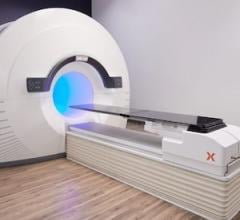September 25, 2014 — A new analysis of published studies found that FDG-PET technology is less accurate in diagnosing lung cancer versus benign disease in regions where infections like histoplasmosis or tuberculosis are common. Misdiagnosis of lung lesions suspicious for cancer could lead to unnecessary tests and surgeries for patients, with additional potential complications and mortality.
Histoplasmosis and other fungal diseases are linked to fungi that are often concentrated in bird droppings and are found in soils.
The study by investigators at Vanderbilt University and the Tennessee Valley Healthcare System-Veterans Affairs was led by Vanderbilt first author Stephen Deppen, Ph.D., and principal investigator Eric Grogan, M.D., MPH, and appeared in the Sept. 24 issue of JAMA.
Positron emission tomography (PET) combined with fludeoxyglucose F18 (FDG) is currently recommended for the noninvasive diagnosis of lung nodules suspicious for lung cancer. To estimate FDG-PET diagnostic accuracy, the authors reviewed lung cancer abstracts published in a 14-year period and included 70 studies in the meta-analysis. The studies included 8,511 nodules, 60 percent of which were malignant.
"The accuracy of FDG-PET for diagnosing lung nodules varied widely from study to study," said Deppen, assistant professor in thoracic durgery. "FDG-PET scans had more false positive results and, therefore were less specific in diagnosing lung cancer in regions of the world where infectious lung disease is common in the general population."
The most prevalent fungal lung diseases in the United States are histoplasmosis, coccidioidomycosis and blastomycosis. All three fungi reside in soils. Histoplasmosis and blastomycosis are common across much of the Mississippi, Ohio and Missouri river valleys and through southern Ontario, Canada, and coccidioidomycosis is prevalent in the southwestern United States.
These infections can cause inflamed nodules in the lungs (granulomas), which can be mistaken for cancerous lesions by radiographic imaging.
In previous meta-analyses, FDG-PET was reported to be 90 to 94 percent accurate in the characterization of malignant or benign lung nodules. However, the current analysis found that FDG-PET was less reliable in regions where fungal lung disease is endemic.
"The frequency of benign lesions in these geographic regions could lead to unnecessary biopsies or lung surgeries in patients," said Grogan, staff surgeon at Veterans Hospital, assistant professor of surgery in the Department of Thoracic Surgery and assistant professor of medicine in the Institute for Medicine and Public Health at Vanderbilt. "However, some medical practices achieved greater test accuracy through robust reading methods, even in these regions."
The authors suggest that the use of FDG-PET to diagnose lung cancer be limited to non-endemic regions unless an institution has substantial and proven expertise in FDG-PET interpretation.
For more information: www.mc.vanderbilt.edu


 February 13, 2026
February 13, 2026 









